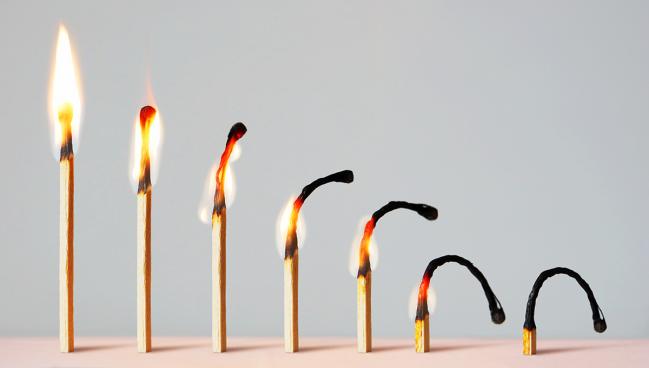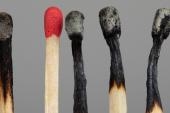Braking Before the Breaking Point: Burnout in Interventional Cardiology
With attendings working 63 hours per week in a stressful environment, continued talks about burnout risks are needed.

Fascinated by the prospect of a glorious Michigan summer evening waiting for me, I sat in a dimly lit darkroom wrapping up an imaging study report. It was later than I had hoped to still be at the hospital, and as I was getting ready to pack up, my phone pinged. The notification gripped my attention with the headline of a new article summarizing a multisocietal survey: “Burnout in Interventional Cardiology.”
Already committed to the interventional career path, I was well aware of the prevalent issue of burnout. However, when I came face-to-face with the concrete numbers presented in the JACC: Cardiovascular Interventions paper—one which was deemed “alarming” by the journal’s editors—the gravity of the issue truly hit home. Before reading this survey of 1,159 interventional cardiology attendings and 192 fellows, including nearly 50% international participants, I had naively believed, and hoped, that the problem of burnout was confined to specific institutions. Yet, the study revealed the widespread nature of this phenomenon. I remember feeling similar emotions after some of the more challenging CCU calls or when patients didn’t do well despite our best efforts. I saw myself possibly heading down this road and wanted to find ways to reduce the risk of that happening.
I began by reflecting on why I chose this field. Working in the cath lab is deeply satisfying. At times, I have found myself close to experiencing what some call a state of flow: the distractions fade and everything happens in the moment. The technology is fascinating, always presenting something new to learn. Each day brings enthusiasm. Teamwork is a big part, which is energizing. And most importantly, at the heart of it all, is a patient—a fellow human, in their hour of need. We give our best to help them through tough times. Being a part of this profession is as meaningful as I can imagine.
But physician burnout is real. It’s a complex issue, with many factors at play. Despite how rewarding our field can be, it can feel overwhelming and defeating at times.
Interventional cardiology attendings polled in the survey work an average of 63 hours per week. This prolonged workload is a major factor contributing to burnout, as studies have suggested. As a fellow, I've become accustomed to these hours and have accepted them as part of my learning experience. However, working such long hours over time not only is exhausting but also detracts from the time needed to nurture other life tasks and goals. It takes away moments with family and friends, limits time for hobbies, and restricts the chance to prioritize both physical and mental health.
Loneliness was another prevalent finding in the survey. It struck me that despite 86% of respondents living with a partner, a staggering 84% felt lonely. It's ironic that those practicing a profession rooted in teamwork and daily human interaction face such pervasive isolation. Yet, there are clear reasons for this. Our work is relentlessly stressful as we deal with severely ill patients and the constant fear of irreversible mistakes. When we return home, separating our work-selves from our home-selves is a challenge.
Our workplace atmosphere is kept as professional as possible out of necessity for effective job execution. But we must recognize that this is not a complete human relationship. Limited expression of our emotions at work means that we need someone outside the hospital with whom to share our often-intense thoughts and feelings. However, building and maintaining strong relationships takes time. Given the frequent relocations required for our training and the high demands of our work, it's unsurprising that we often don't prioritize that time for relationships.
Another shocking finding from the survey was that almost 40% felt they achieved less than they believed they should. Medicine is a competitive field, and the path to a career in interventional cardiology demands navigating through multiple bottleneck stages. There's constant inner pressure to do more, gain a competitive advantage, and secure your position. This drive for excellence, which fuels our motivation and achievements, can also lead to a sense of restlessness and can, at times, be exhausting. The "fire in our belly" does cause heartburn from time to time.
Babar Basir, DO (Henry Ford Hospital, Detroit, MI), who I spoke with about this topic, attributed several of the survey findings in part to post-pandemic exhaustion. He emphasized the importance of finding purpose at work, be it through culture, religion, or personal motivation, as a shield against burnout, and suggested that reducing workload, even at the expense of lower compensation, might restore balance. He also called for advocating for increased administrative support to aid interventional cardiologists in reducing the risk of burnout.
While the field of interventional cardiology demands high-level performance, and we are all committed to meeting these expectations, there are aspects of the system that can be modified and need attention. In an editorial accompanying the survey, Mohamad Alkhouli, MD (Mayo Clinic, Rochester, MN), said the first step should be acknowledging the truth of the situation. Systemwide realignment is necessary to address the issues brought to light in the survey. This is significant because we are all part of the same larger whole, and our happiness and suffering are interconnected. As members of the cardiology community, we must continue this ongoing discussion.
Tushar Mishra, MD, is a second-year general cardiology fellow at Wayne State University/Detroit Medical Center in Detroit. Raised in India…
Read Full Bio




Comments